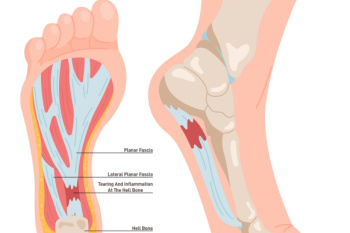 Plantar fasciitis causes heel pain, resulting from inflammation of the plantar fascia, the thick band of tissue that runs along the bottom of the foot and connects the heel bone to the toes. It typically occurs due to repetitive strain or overuse, often seen in runners, individuals with high arches or flat feet, and those who stand for prolonged periods. The pain from plantar fasciitis is usually sharp and most intense with the first steps in the morning or after periods of inactivity. It may decrease with movement but can return after long periods of standing or walking. Relief can consist of rest, stretching exercises, and taking anti-inflammatory medication. Wearing supportive shoes and using orthotic inserts can also help. Preventative measures involve maintaining a healthy weight, performing regular foot stretches, and avoiding excessive strain on the feet. If left untreated, plantar fasciitis can lead to chronic heel pain and other complications. If you have heel pain, it is suggested that you visit a podiatrist for a proper diagnosis and an effective treatment plan.
Plantar fasciitis causes heel pain, resulting from inflammation of the plantar fascia, the thick band of tissue that runs along the bottom of the foot and connects the heel bone to the toes. It typically occurs due to repetitive strain or overuse, often seen in runners, individuals with high arches or flat feet, and those who stand for prolonged periods. The pain from plantar fasciitis is usually sharp and most intense with the first steps in the morning or after periods of inactivity. It may decrease with movement but can return after long periods of standing or walking. Relief can consist of rest, stretching exercises, and taking anti-inflammatory medication. Wearing supportive shoes and using orthotic inserts can also help. Preventative measures involve maintaining a healthy weight, performing regular foot stretches, and avoiding excessive strain on the feet. If left untreated, plantar fasciitis can lead to chronic heel pain and other complications. If you have heel pain, it is suggested that you visit a podiatrist for a proper diagnosis and an effective treatment plan.
Plantar fasciitis is a common foot condition that is often caused by a strain injury. If you are experiencing heel pain or symptoms of plantar fasciitis, contact Donald Manger, DPM from Associated Podiatric Physicians, PA. Our doctor can provide the care you need to keep you pain-free and on your feet.
What Is Plantar Fasciitis?
Plantar fasciitis is one of the most common causes of heel pain. The plantar fascia is a ligament that connects your heel to the front of your foot. When this ligament becomes inflamed, plantar fasciitis is the result. If you have plantar fasciitis you will have a stabbing pain that usually occurs with your first steps in the morning. As the day progresses and you walk around more, this pain will start to disappear, but it will return after long periods of standing or sitting.
What Causes Plantar Fasciitis?
- Excessive running
- Having high arches in your feet
- Other foot issues such as flat feet
- Pregnancy (due to the sudden weight gain)
- Being on your feet very often
There are some risk factors that may make you more likely to develop plantar fasciitis compared to others. The condition most commonly affects adults between the ages of 40 and 60. It also tends to affect people who are obese because the extra pounds result in extra stress being placed on the plantar fascia.
Prevention
- Take good care of your feet – Wear shoes that have good arch support and heel cushioning.
- Maintain a healthy weight
- If you are a runner, alternate running with other sports that won’t cause heel pain
There are a variety of treatment options available for plantar fasciitis along with the pain that accompanies it. Additionally, physical therapy is a very important component in the treatment process. It is important that you meet with your podiatrist to determine which treatment option is best for you.
If you have any questions, please feel free to contact our office located in Hamilton Township, NJ . We offer the newest diagnostic and treatment technologies for all your foot care needs.
